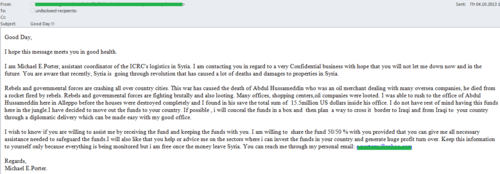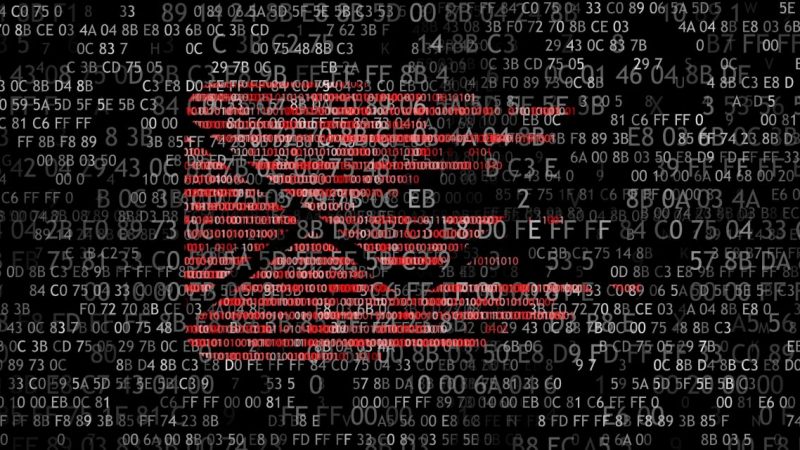
The continuing conflict and the complex political situation in Syria have created the perfect conditions for new ‘Nigerian’ scams. In recent months, there has been a surge in the number of Nigerian letters that contained some sort of reference to Syria; scammers sent messages both in the names of ordinary citizens of that country and on behalf of representatives of banks and humanitarian organizations. The texts of the messages made frequent use of words such as “turmoil”, “crisis” or “revolution”.
The scam messages, written in the names of representatives of reputed Syrian and UK banks, stated that their clients would like to transfer their multi-million savings from their accounts because of the unrest in Syria, and were looking for a partner who would help them to do so. Naturally, “compensation” was offered, of which the scammers were ready to tell the recipient either immediately or once they had received a reply. The scammers gave a contact phone number and an email address; the latter could be either the sender’s address or the personal email of the “bank’s client” who allegedly needed help. The scammer’s aim was to entice the victim into an email exhange. After all details of the future partnership are discussed, the victim will most probably be asked to perform a service, e.g. transfer a small amount of money to pay for the mediator’s services. When the money is transferred, the scammers will vanish just as suddenly as they appeared.
The scammers posed as members of the International Committee of the Red Cross, and told the sad story of an oil trader who had died in the Syria turmoil, and whose fortune was saved by a Red Cross employee. As you might expect, the sender asks for help in transferring and looking after the money. The recipient of the letter would supposedly receive the promised millions in a parcel that would first be delivered to Iraq and then to the recipient’s country of residence. For his or her help, the recipient is promised half of the money. In addition, the scammers state they would welcome any advice or assistance on how to make a profitable investment. The scammers give a personal email address for contacting them.
Some of the emails we have seen appear to have been sent using the names of ordinary people, and came in a variety of flavors. For instance, a “teacher from Syria” asked in one message to help orphaned children who had inherited a large sum from their parents to leave the country and invest the money.
Other Nigerian letters are allegedly written on behalf of people who are critically ill and who would like to donate some of their money. The letters ask their potential victims to help them do so. Other messages are very brief, contain no proposals for cooperation and only suggest getting to know the recipient better. This is a trick aimed at getting the victim’s attention and enticing them into further communication.
The Nigerian scammers use a wide variety of tricks; one thing they have in common, however, is that all messages take advantage of people’s natural desire for “easy” money and to help people in distress. The scammers concoct all sorts of stories – at times, far-fetched – and use the names of well-known people and major events to make the victim believe them. Of course, users should not respond to these types of emails. Otherwise, once you find yourself in communication with a Nigerian scammer, you risk losing your money.
‘Nigerian’ Letters – Now With a Syrian Twist
























sharlene ball
I have been a victim of email fraud, A Nigerian emailed me and posed as a U.S Soldier. “My Name is Rosine Diatta,i hope all is well with you? I am a soldier working as United Nations peace keeping troop in Afghanistan,
on war against terrorism. I have in my possession the sum of $3.5million USD Which i made here in Afghanistan,
I deposited this money with a Red Cross agent. I want you to stand as my beneficiary and receive the fund and
keep it safe so that as soon as am through with my mission here in Afghanistan,you will assist me to invest it in a good profitable venture,
I will give you 50% of the total money for your assistance after you have receive the money.
please reply back to me if you are willing to work with me so that i can send you the information
where the money is been deposited your urgent reply is needed.”
I had a conversation with this person for days , I have more emails from this person
Mary jane Diaz
I been a scam one month ago, and he is A US Army marine.he said that he deploy in Syria,which is his payment he want to be safe,so he told his gf which is my cousin that he will send the money he will be put on a box .and my counsin ask me if i want to accept the parcel as a reciever then i agree.so i didn’t expect that i have a part of there that i need to pay the receipt.then i do my part i went to money gram and send to Philippines ,i ask why is in the Philippines,he said that they will release the receipt there.so ignore.and i send the money the amount of 750SD.and now we recover that we being a scam coz he ask again a money so my cousin didn’t give.i hope you will help me to get back my money.
Alvina Mason
Thank you fore posting this because we were almost cought up in a similar scam. We did loose 365 but no more, but they wanted us to pay 625 to deliver the boxes again. His name was Morris bally and he sais he works for 5he syrian red cross.
Jaana Hemminki
Hello from Finland. We had problems with Facebook, there are lot of USA military soldiers who want’s to be your friend. It always starts the same way; Hello my friend, how are you today…plaap-plaap…And as soon as you are honey and darling, wife and the military wants to come to you. The only problem is the money, he has it but needs it to get out of the country. The country is Afghanistan, Syria or anyone else…
Do your article these the US “soldiers”, they are using genuine soldiers in their profile photos and if you make a accusation to Facebook, it often does not lead to anything.